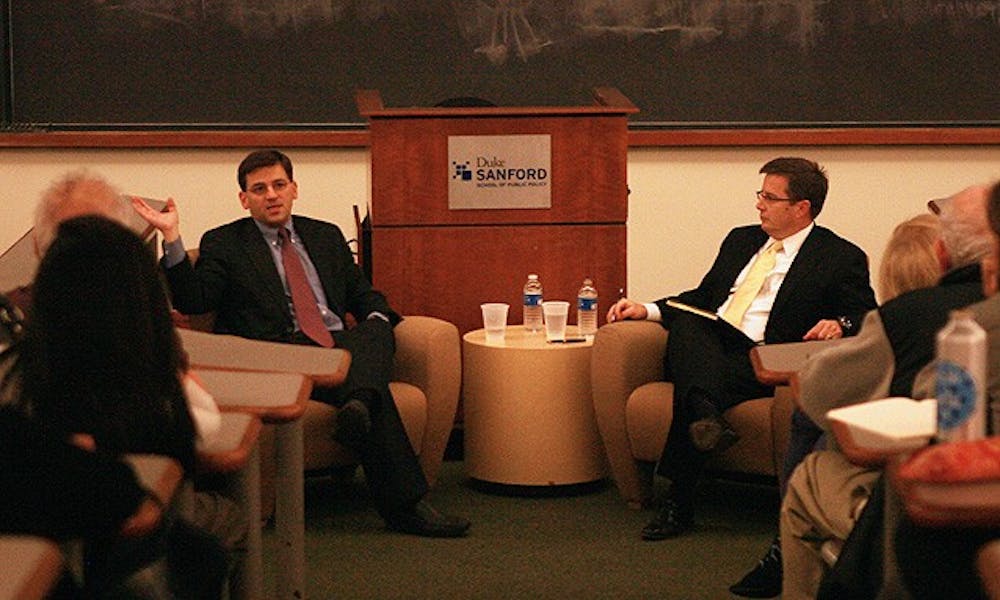The way the public views a presidency is shaped not only by an administration’s policies, but also by the people who stand on the sidelines of history and document it. Peter Baker, The New York Times’ White House correspondent, relayed his experiences as the interface between government and citizens Thursday evening.
Journalism is about illuminating issues and holding people accountable, Baker told a large audience of students and faculty gathered in the Sanford School of Public Policy. For Baker, this assertion comes from comprehensive experience. Before joining The New York Times in 2008, Baker was a reporter for The Washington Post, for which he covered both the Bill Clinton and George W. Bush administrations. In the lecture, which was formatted as a conversation with Peter Feaver, Alexander F. Hehmeyer Professor of Political Science, Baker spoke extensively on President Barack Obama, particularly with regard to his foreign policy approach.
The recent unrest in Egypt has presented Obama with an unexpected test, Baker said, especially because the first two years of his presidency have been defined more by domestic issues than international concerns.
“Foreign policy doesn’t go away. Foreign crises can happen at any time, at any place,” he said, adding that it is often difficult to balance competing interests.
Baker also touched on Obama’s successful campaign to push through the Senate the “New START” treaty with Russia, asserting that it showed the president’s critics that Obama could take a hard-line stance when he wanted to.
The reporter also provided the audience with some insight into Obama on a more personal level.
“I think you have to be confident to the point of almost arrogance to be president of the United States,” he said, responding to a question about the president’s possible weaknesses. Baker added, though, that he thinks Obama is cognizant of his own limitations, calling him “open.”
In part, he noted, this flexibility stems from Obama’s realization that the promises he made on the campaign trail—like a commitment to open dialogue with enemies—are easier said than done.
Drawing from his own experiences covering the Clinton and Bush presidencies, Baker highlighted similarities between the current administration and the two preceding ones. Clinton and Obama, he said, are alike in that they both like to dive deep into policy decisions, and both were academic instructors before assuming executive office. Obama’s staff, in particular, is composed of many academics, although he has a wide range of advisers, he added.
Even Bush, Baker declared, shares some similarities with Obama, ideology aside.
“Obama shares some of the discipline that Bush showed,” he said, noting the two men’s timeliness in particular. Recently, Baker added, Obama has even used language reminiscent of his predecessor, noting his commitment to “do[ing] big things.”
Baker’s remarks also centered on the changing nature of journalism—he believes that the advance of new technologies like Twitter has altered the journalistic landscape.
In looking to the future, Baker tied his lecture back to his audience. It will be the responsibility of up-and-coming reporters, he said, to maintain journalism’s “core values” in a profession that is rapidly changing.
“Journalists have to be fair,” he said. “Journalists have to be accurate.”
Feaver said he thought it was beneficial for students to hear Baker speak and see the person behind the byline.
“I think he’s one of the best White House beat reporters in the business, and of course he writes for one of the most important papers,” he said. “We’ve all read his stuff, we all teach his stuff and it’s great to meet him in person.”
Students seemed receptive to Baker’s message. Junior Lauren Pfeiffer said she came to Baker’s lecture because of her interest in journalism. Although she said she thought Baker did a “great job,” she was also intrigued by the audience’s questioning.
Junior Nick Setterberg said he especially appreciated how Baker was able to apply his own experiences—like living in Moscow—to analyze present issues.
“I think he had some great insight about Russia. I just spent last semester there, and a lot of what he talked about was definitely true,” he said.
Get The Chronicle straight to your inbox
Signup for our weekly newsletter. Cancel at any time.

